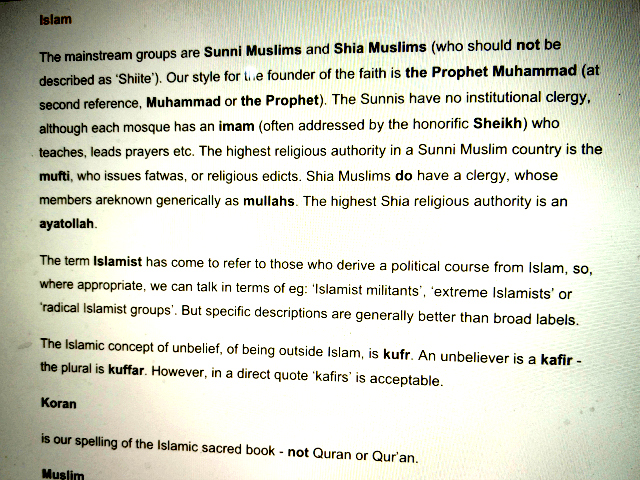Journalists at the British Broadcasting Corporation (BBC) should refer to the Islamic prophet, Mohammed, as “the Prophet”, according to the corporation’s in-house style guide.
Under the section labelled “Muhammad”, the guide says: “For the founder of Islam, our style is the Prophet Muhammad; at second reference Muhammad or the Prophet.”
This advice is repeated in the sections on “Arabic names” and “Islam”.
The assertion that Mohammed is “the Prophet”, with a capital P, will likely cause controversy. While followers of Islam believe him to be the last prophet sent by God – Christians, Jews, atheists and followers of other religions do not regard him as a prophet at all.
There are also questions over whether Mohammed and Islam are being given special treatment in the style guide, which does not tell journalists how to refer to significant figures from other religions.
It does not, for example, tell staff to refer to Jesus as “Son of God”, “Our Lord” or “The Messiah”, nor does it say to call the Buddha by any of his Ten Titles, or offer any advice on how to refer to holy figures from Hinduism or Sikhism.
The guide also teaches journalists how to refer to non-believers of Islam, stating: “The Islamic concept of unbelief, of being outside Islam, is kufr. An unbeliever is a kafir – the plural is kuffar. However, in a direct quote ‘kafirs’ is acceptable.”
This is not the first controversy the BBC has found itself in over the subject of Islam. In November, it used the words “hateful”, “Islamophobic” and “bad timing” to describe a hashtag used by atheist ex-Muslims to explain why they left the faith.
Former Muslims tweeted under #ExMuslimBecause, expressing views such as “I know being a woman doesn’t make me lesser” and “I couldn’t handle hearing my own family say that Shi’as, my neighbours and best friends, are kuffar”.
However, a BBC programme on the hashtag featured two male Muslim “community experts” calling it “problematic ” and “hateful”.
Yesterday, Breitbart London reported how the BBC’s style guide also tells journalists to avoid using the term “pro-life” to refer to campaigners against abortion, but encouraged the use of “pro-choice” to refer to their opponents.
Pro-life campaigners called it “an utterly shameless example of institutional bias against the right-to-life movement, and for the abortion lobby.”

COMMENTS
Please let us know if you're having issues with commenting.